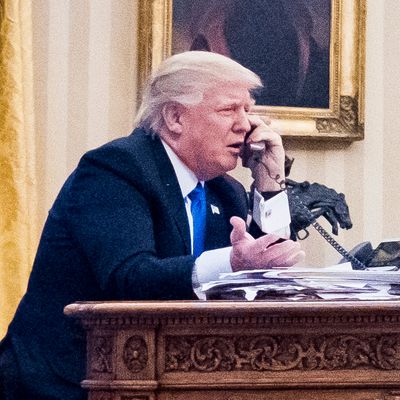
A report about heated remarks President Trump made to Australian prime minister Malcolm Turnbull during a Saturday phone call has sparked an incident with the close U.S. ally, and confusion over whether the U.S. will honor a refugee resettlement deal.
Senior U.S. officials told the Washington Post that, after bragging about the size of his electoral college win, Trump lashed out at Turnbull when the latter tried to confirm that the U.S. would honor its commitment to take 1,250 refugees from an Australian detention center. Trump reportedly fumed, “This is the worst deal ever,” complaining that he was “going to get killed” politically and accusing Australia of trying to send over “the next Boston bombers.”
When Turnbull suggested they move on to other topics, Trump ended the call. The discussion, which was expected to take an hour, lasted about 25 minutes. Trump reportedly told Turnbull that he had spoken with four other world leaders that day, and “this was the worst call by far.”
The disagreement concerns about 2,500 mostly Muslim refugees who were rejected by Australia and are being held in facilities on New Guinea’s Manus Island and the island of Nauru. After human-rights organizations criticized the conditions in the detention centers, the Obama administration reached an agreement to settle about half of the refugees in the U.S.
President Trump’s order to temporarily ban refugees and certain immigrants from entering the U.S. raised questions about whether the agreement would be honored, since many of the refugees are from Iran, Iraq, Sudan, and Somalia. A line in the order says exceptions will be made for those authorized to enter the country under “a preexisting international agreement,” but Trump was still unhappy about the deal.
He reportedly told Turnbull, “I don’t want these people,” and repeatedly said the U.S. had agreed to take 2,000 refugees, when the number is actually 1,250. Trump said it was his “intention” to honor the deal, but warned that they would be subjected to “extreme vetting.” Under the terms of the deal, the U.S. does not have to accept any refugees who fail the usual vetting processes for those trying to enter the U.S.
The initial White House readout on the call said that the two leaders merely “emphasized the enduring strength and closeness of the U.S.–Australia relationship that is critical for peace, stability, and prosperity in the Asia-Pacific region and globally.”
A separate AP report on Wednesday, which was based on a readout written by White House aides, suggested that Trump threatened to send U.S. troops into Mexico during a call with President Enrique Peña Nieto. According to a transcript of the call obtained by CNN, Trump actually offered to help Nieto with the drug cartels, saying, “You have some pretty tough hombres in Mexico that you may need help with. We are willing to help with that big-league, but they have to be knocked out and you have not done a good job knocking them out.”
The Post report sparked an uproar in Australia, and there were mixed signals from U.S. and Australian officials on the status of the refugee resettlement deal. At first, Turnbull said Trump “assured me that he would continue with” the resettlement, but declined to confirm other details about the call. Then the U.S. embassy in Canberra issued this statement, referring to previous assurances made by White House press secretary Sean Spicer:
President Trump’s decision to honor the refugee agreement has not changed and spokesman [Sean] Spicer’s comments stand. This was just reconfirmed to the State Department from the WH [White House] and on to this embassy at 1315 Canberra time.
About an hour and 40 minutes later, President Trump contradicted the State Department on Twitter, saying he was still considering “this dumb deal” to take in “thousands of illegal immigrants.” (As the Guardian notes, under international and Australian law, it’s not illegal for refugees seeking asylum to arrive in a foreign country without the proper documents.)
In radio interviews, Turnbull said the U.S.–Australia alliance “is absolutely rock-solid, it is so strong,” and stressed that President Trump had personally committed to preserving the agreement. When Sydney’s 2GB radio asked if he’d seen the tweet, he said, “Well, that is his tweet. I’m telling you what’s been said to us.”
The Australian opposition leader criticized Turnbull for not being more open about his interaction with President Trump, but a cabinet minister tried to put a positive spin on the incident.
“Malcolm has stood up for Australia — he actually had a row with the president of the United States and he hasn’t crowed about it. He has since gotten on with the job,” the minister told the Sydney Morning Herald.
“We are offended, but as long as these people [refugees] get off Manus and Nauru, that’s the main thing. I’m confident the deal will be honored; this is part of the process. Trump is trying to get the message out that he hates the deal but can’t do anything about it.”
According to the paper, some in Canberra are speculating that White House adviser Steve Bannon leaked details about the call so Trump can say he grudgingly accepted a deal that goes against the spirit of his immigration order.
Malcolm Davis, a senior defense analyst at the Australian Strategic Policy Institute — an independent, nonpartisan think tank — told the paper that Australians need to figure out how to preserve their alliance with the U.S., regardless of the president’s intentions.
“For this to happen is unconscionable. I think that probably where we need to take this is [to] rise above it, make sure we don’t let this derail a vital relationship, because it’s too important to let go,” he said. “But we need to be on our guard because this guy is totally unpredictable … He’s completely clueless.”






























